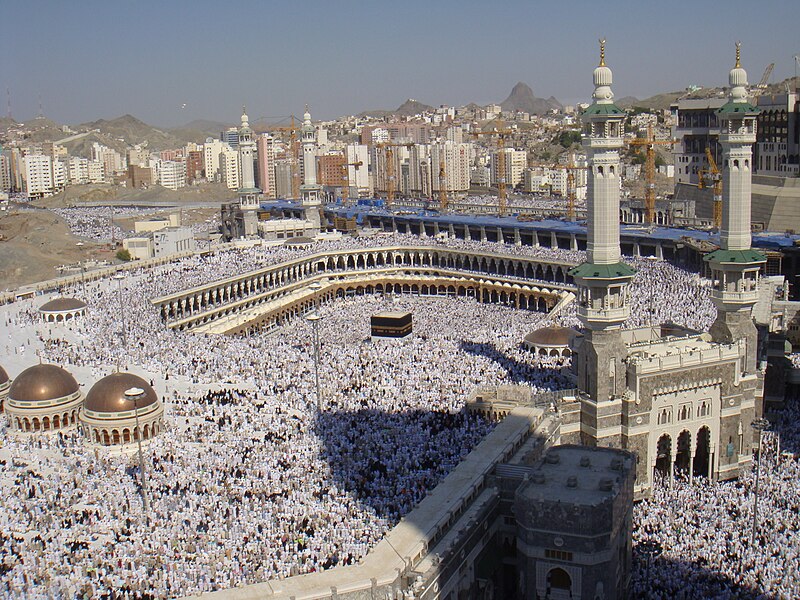 |
| https://commons.wikimedia.org/wiki/ File:Al-Haram_mosque_-_Flickr_-_Al_Jazeera_English.jpg |
There are apparent differences between Islamic and western liberal worldviews. Different societies emerge based on differences in worldview (Ibrahim, 2000; Zaman, 2010; 2014). At present, a civilization (Muslims) with a record of global leadership for more than a millennium, representing 24% of global population, 21% of land area, abundance in resources (natural and Human), occupies central location in global map, located around the traditional marine root, but voiceless in global decision-making forums. How long shall such a state of decline remain in operation? How long Holocaust[1][2][3] of the members shall be tolerated? How long to keep the eyes closed from internal and external challenges?
Muslims have only two choices. Either surrender to the
modern liberal civilisation and become part of the global community or stand
together to face the challenges. As Huntington (1993) predicted,
"differences between civilisations are real and important; civilisation
consciousness is increasing; conflict between civilisations will supplant
ideological and other forms of conflict as the dominant global form of
conflict”, is happening around. Fault lines between Islamic and western liberal
civilisation are eternal—beyond bridging. For example, consider the difference
in global media reporting of an act of terrorism, based on the identity of
criminal—Muslim or Western. In the case of a Muslim, it is propagated that
Muslims are inclined to terrorism and they are not fit in modern society, while
in case of a western, it remains an individual’s act. Even in traditionally
liberal western countries “Scarf (veil) and Burkini” of Muslim women are not
tolerated (BBC, 2018; Independent, 2017). Azan is not allowed; Minarets of Mosques
are not tolerated (The New York Times, 2009). Perocco (2018) documents that Islamophobia
has proven widely spread form of racism during last two decades in Europe,
produced by social actors—including anti-Muslim organizations and movements,
far-right parties, best-selling authors, and the mass-media—through an
articulate and interdependent set of key themes and policies/practices, to
inferiorise and marginalise Muslim immigrants.
The choices remained in front of Muslims during the last
century (with the fall of the Ottoman Empire). However, they have not unanimously
voted for modern liberal civilisation. In fact, Turkey (who opted for modern
liberal civilisation, earlier) started repenting towards Muslim civilisation,
in the 21st century, under the leadership of Justice and Development
party (Maessen, 2012). However, what is required to stand shoulder to shoulder
with members of the other civilisations is largely missing within the OIC
region. Unity and cooperation are catalysts in fighting against poverty,
illiteracy, external threats and achieving progress and prosperity. Muslims are
duty bound to union and brotherhood, as guided by Allah (SWT):
“And hold fast, all of you together, to
the rope of Allah (i.e. this Qur'an), and be not divided among
yourselves , and remember Allah's Favour on you, for you were enemies one to
another but He joined your hearts together, so that, by His Grace, you became
brethren (in Islamic Faith), and you were on the brink of a pit of Fire, and He
saved you from it”
[3: 103, Al-Qur’an, 1984].
The blog is not an incitement for rebellion or war
against any other society or civilisation, and it must not be
misunderstood/misinterpreted. It calls for compassion, unity, and all-inclusive
progress and prosperity through collective decision-making of members of a civilisation—distinctly
different from modern liberal civilisation—to survive respectably, contribute
in global peace and prosperity, and get their due place in the global affairs.
Al-Qur’an
(1984), Arabic Text and English Translation, (by Al Hilali
& Khan), King Fahad Complex for the Printing of The Holy Qur’an, Madina,
KSA. Available at Islam tomorrow (Yusuf Estes) [Accessed on Oct 31 2017] http://islamtomorrow.com/downloads/Quran_Khan.pdf
BBC
(2018, May 31). [Online] available : https://www.bbc.com/news/world-europe-13038095 (January 7, 2019)
Huntington,
S.P. (1993), “The Clash of Civilisations?”, Foreign Affairs Vol.
72 No.3, pp. 22-49.
Ibrahim,
S.H.B.M. (2000), The need for Islamic accounting: perceptions of its
objectives and characteristics by Malaysian Muslim accountants and accounting
academics, Thesis for: PhD in Accounting, University of
Dundee, Scotland.
Independent
(2017, Dec 11). [Online] available: https://www.independent.co.uk/news/world/europe/burkini-ban-geneva-bare-arms-legs-a8102701.html (January 7, 2019).
Maessen,
E. (2012), “Reassessing Turkish National Memory: the AKP and the Nation: An
Analysis of the Representation of Turkish National Memory and Identity by the
AKP”, Master Thesis, Utrecht University.
Perocco,
F. (2018), “Anti-Migrant Islamophobia in Europe. Social Roots, Mechanisms and
Actors”, REMHU, Rev. Interdiscip. Mobil. Hum., Brasília, Vol. 26, No. 53, pp.
25-40 http://www.scielo.br/pdf/remhu/v26n53/2237-9843-remhu-26-53-025.pdf?fbclid=IwAR2aM6SdFB_3o_qyxd0S3USpiKAo7rsPBsRLqzFXmLsXhlbor0wNpOrCx_8 (Mar 16, 2019)
The
New York Times (2009, Nov 29). [Online] Available: https://www.nytimes.com/2009/11/30/world/europe/30swiss.html (Jan 9, 2019).
Zaman, A. (2010, Jun 10), “On Islamic economics”, The Express Tribune
[Online] available: https://tribune.com.pk/story/19985/on-islamic-economics/ (Jan 9, 2019).
Zaman, A. (2014), "Re-Defining Islamic
Economics", Chapter in Islamic Economics: Basic
Concepts, New Thinking and Future Directions, Cambridge Scholars
Publishing.
[1]
Crawford (2016) reports that 173,000 people killed; and 183,000 seriously
injured in the Afghan war in Afganistan and Pakistan.
[2]
Bump (2018) reports the death of more than half a million people in 15 years
Iraq war.
[3]
Reuters (2018) reports a death toll of more than half a million in Syrian civil
war